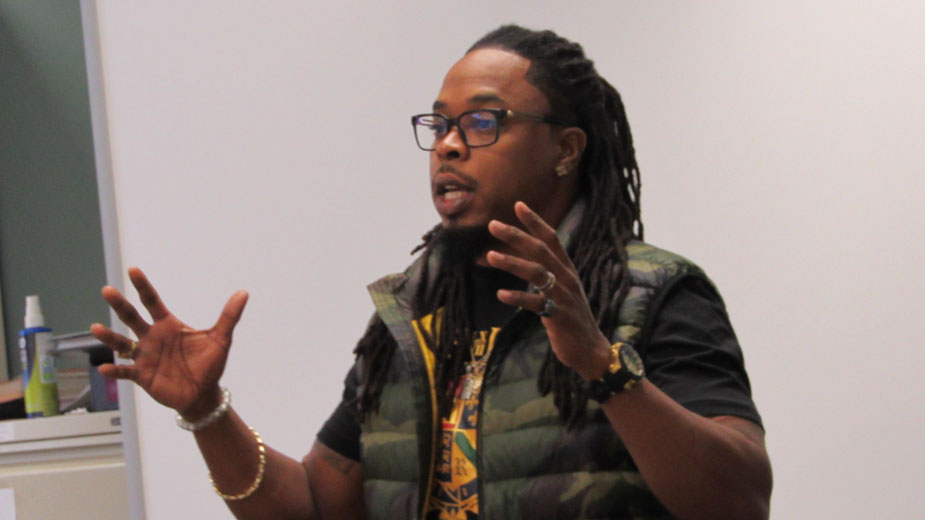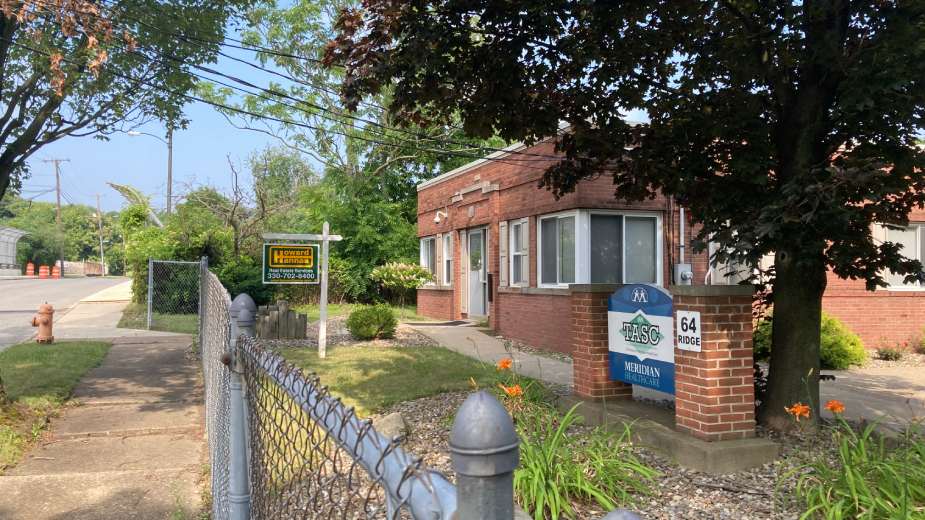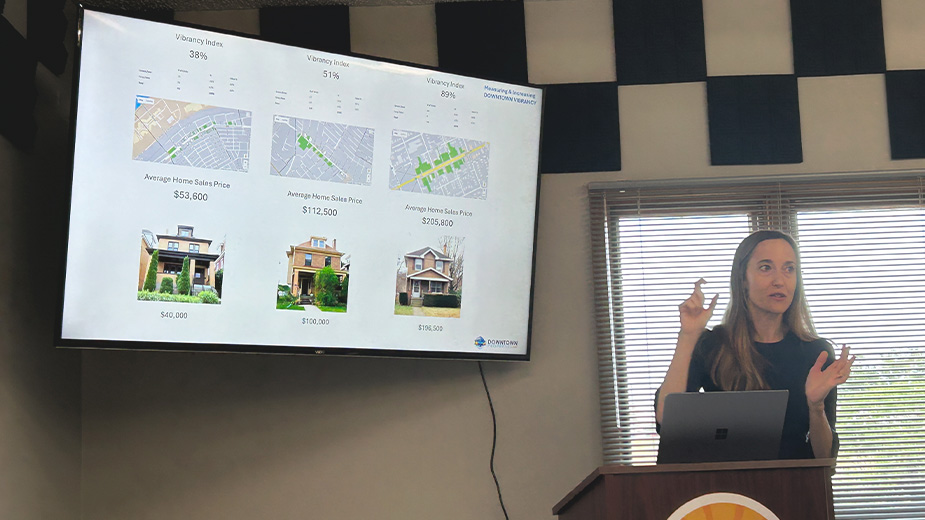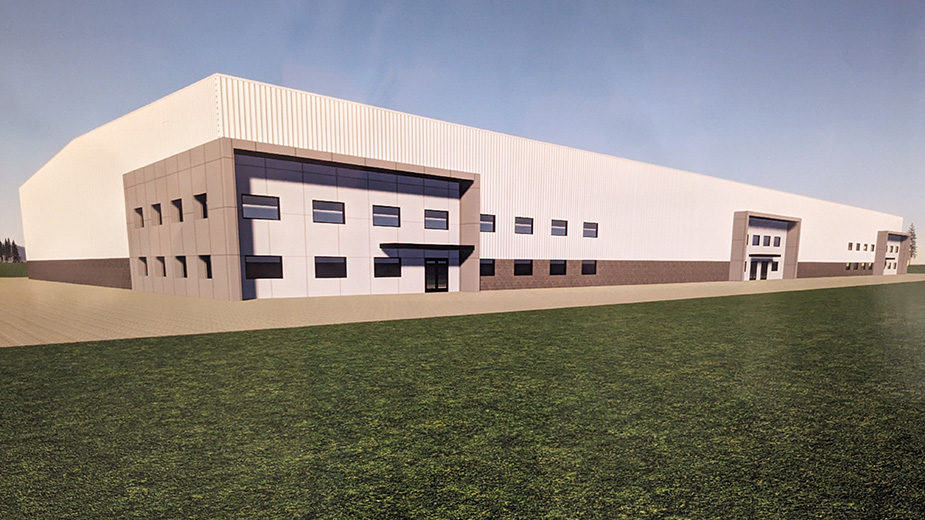Oliver Seeks ARPA Funds for Center ‘Designed to Incubate Community’
YOUNGSTOWN, Ohio – A project being proposed by Councilman Julius Oliver that would support entrepreneurs and the city’s youth is “designed to incubate community,” the 1st Ward councilman said.
The project will face a key vote Monday night, when Oliver and his colleagues on City Council will consider an ordinance to fund the purchase of a building (pictured above) where the proposed community center – although he hesitates to call it that – would be located.
“It’s not actually a community center. It is, but it’s way more,” he clarified.
If approved by council members, the legislation would allocate to the Western Reserve Port Authority $150,000 of the $2 million of the American Rescue Plan Act funds designated for projects in the 1st Ward. The funds would be used to purchase a former Meridian HealthCare building at 64 Ridge Ave.
The port authority’s board of directors approved a resolution in June to accept the ARPA funds and to acquire the property on the city’s behalf.
The center that Oliver envisions would provide incubation space for small businesses. As a condition of tenancy, the business owners would be required to permit high school-age youth to shadow them. That would not only acquaint them with what the business owner does – potentially planting the seeds for teens to start their own businesses later – but also introduce them to people in the neighborhoods so they potentially would be less inclined to cause mischief in the community.
The initiative also addresses a specific unmet need for local youth, he said. While there are several programs that deal with youth who are struggling, at risk or in trouble already, there are no programs to “deal with good kids and make sure they never become bad kids,” he asserted.
“It prevents little Johnny from breaking into Ms. Johnson’s house because he knows Ms. Johnson,” Oliver said.
“We don’t have any programming that strategically raises our kids to become great community members,” he continued. Many youth programs are geared around athletics, which doesn’t interest everyone, he added.

Oliver said he became familiar with the concept when he accompanied Bonnie Deutsch Burdman, director of community relations and government affairs for the Youngstown Area Jewish Federation, on a trip to Israel in 2020. While there, they visited the Akko Center for Arts & Technology, also known as A-CAT, which exposes children of various cultural backgrounds to multiple occupations.
A-CAT is part of the network of such centers – including the Hope Center for Arts & Technology in Sharon, Pa. – that follow the model of the Pittsburgh-based Manchester Bidwell Corp. to help people get themselves out of poverty, according to Burdman. Akko, a city in the northwest part of Israel, is one of the most diverse areas of the nation.
“There’s a tremendous need in the city of Youngstown and surrounding areas for solid growth opportunities for area youth,” Burdman said.
While there are several youth-oriented programs locally, none fulfill “a workforce development type of role where you can capture kids at an early age, teach them life skills, dignity, etc., and ultimately have them grow into adults with the direction of what they want to do with their lives,” she said.
“We’re basically killing two birds with one stone, all of it designed to serve the community with the purpose of sustaining neighborhoods again,” Oliver said. “Youngstown used to be full of mom-and-pop shops all over the place. We want to reintroduce that into our future generations with this programming.”
Ian Beniston, executive director of the Youngstown Neighborhood Development Corp., was involved with early discussions regarding the concept. “Generally speaking, the vision for the project is good,” he said.
The project is “an evolution of multiple ideas” that Oliver has had over time, Beniston said.
YNDC was interested in seeing a facility, particularly in a neighborhood, where young people could see “positive things happening” and “businesses forming and growing,” he said, and could learn basic skills that could help them later in life, whether they became an entrepreneur or decide to work for an existing business.
“The spirit of [the project] from the start has been to bring the services of existing organizations to bear, to have a facility that’s more accessible in a city neighborhood” and not something that requires a participant to go downtown, Beniston said.
Among other organizations that Oliver has approached is the Youngstown Business Incubator.
“I know he has had a vision for doing something like this for ages,” said Barb Ewing, YBI CEO. YBI has “a definite interest” in seeing the program succeed, as the center could provide a space for YBI companies to go, or potentially more than one site if the model is replicated.
“If we can help identify and strengthen businesses that go into that space through our counseling programs and getting loan certifications, whatever the case may be, they’re more likely to succeed than if you just pop a business into a space and they don’t have any support network behind them,” Ewing said. “There’s never any guarantee but you’re far more likely to succeed if you’ve got somebody helping to develop that business.”
Tanisha Wheeler, regional director of the state Minority Business Assistance Center housed at YBI, said the councilman reached out to YBI because of the incubator’s youth program, which has a mixed media component as well as business development.
YBI would be able to work with the center’s tenants though the MBAC program and help to connect them with financing sources such as Valley Partners or available government programs, Wheeler said.
Edna Edmonds, director of operations at the Boys & Girls Clubs of Youngstown, was involved with early discussions about the center. She said the club would be able to bring its members to the proposed centeras part of its CareerLaunch program. It would provide a “great platform” for kids to see the steps that are taken to create a business.
“They are actually able to see someone from their community that looks like them, from the same city as them, from the same side of town as them, create a business form the beginning to the end, Edmonds said. “A lot of our kids only see the final product and they want to emulate that. But it’s important that our kids see the hard work that goes into the final product and how to get to that point step by step.”
Nevertheless, James Bird, CEO and executive director of the Youngstown Boys & Girls Clubs, expressed concerns. His organization, in partnership with federal and state governments, is investing $3.5 million in a planned renovation and expansion. Further, the city already has a business incubator, a community college and several youth organizations.
Bird also said that Oliver, who he acknowledged is “very concerned about the youth and adults,” had never spoken to him directly about his plans and he only learned about the project though media reports.
“Why aren’t we investing money in things that already work?” Bird asked. One of the lessons learned during the pandemic was the value of collaboration among nonprofits rather than “reinventing or doing what somebody else is doing.”
Oliver argued that his initiative is designed to work in collaboration with existing programs. In addition to the local Jewish Federation, organizations he said he has been working include Choffin Career Center and Smarts Community Art School.
He noted that since the COVID-19 pandemic, youth organizations have seen decreases in membership.
“We’re not trying to recreate the wheel. Each partner will do what they do well within this program,” he said. The plan is for the proposed new center to increase the number of members for youth organizations across the city by serving as a hub that disseminates kids to other organizations, even as they learn to be “entrepreneurs and successful business and community members” from the center’s tenants.
“We plan on enhancing every other youth organization. If you do something well already, we want to partner with you to get more kids to do that thing well,” he remarked.
“Half of the work we do happens outside of this building. We are always trying to reach the students and families that might not get here and we find community partners that allow us to do that,” said Becky Keck, Smarts president. “Our mission is to reach those students and families that are unreachable. So any idea or any notion of anything happening with youth anywhere is an important thing for us to explore.”
Keck and Sarah Gabrick, assistant Smarts director, joined Oliver and other community members for a trip to Boxspot in Cleveland, a retail center made from shipping containers. Keck notes that several Smarts students are from Oliver’s ward.
“We’re always building our community. So we’re always trying to reach the students and families that are the hardest to reach. We’re always open to meet new potential community partners,” Keck said. She praised Oliver for “bringing potential partners to the table that even in my experience I’ve never met before.”
Oliver said he will seek additional ARPA funds for maintenance and programming, and he and other proponents will conduct a fundraising campaign and seek sponsorships.
The local Jewish Federation hasn’t committed to funding for the initiative yet, but Burdman suggested the federation’s Thomas Family Endowment could be a potential funding source. The endowment has supported both A-CAT in Israel and HopeCat in Sharon. “I’ve already encouraged the leadership in this center initiative to keep the next application deadline on their radar screens,” she said.
Oliver is ambitious regarding the center’s impact if it becomes a reality.
“What this will do is strategically change the narrative of our city so that five, 10 years from now, our youth are in a totally different place mentally than they are now,” he said.
Copyright 2024 The Business Journal, Youngstown, Ohio.



